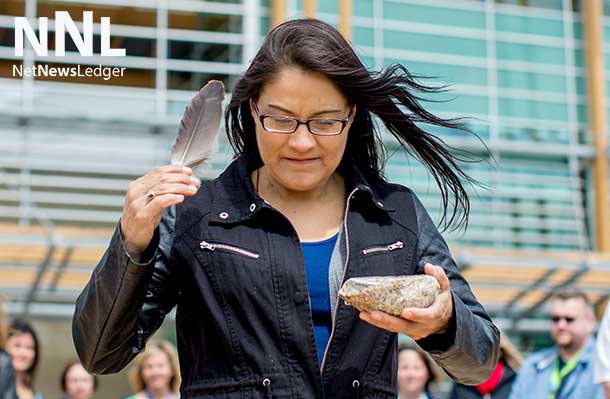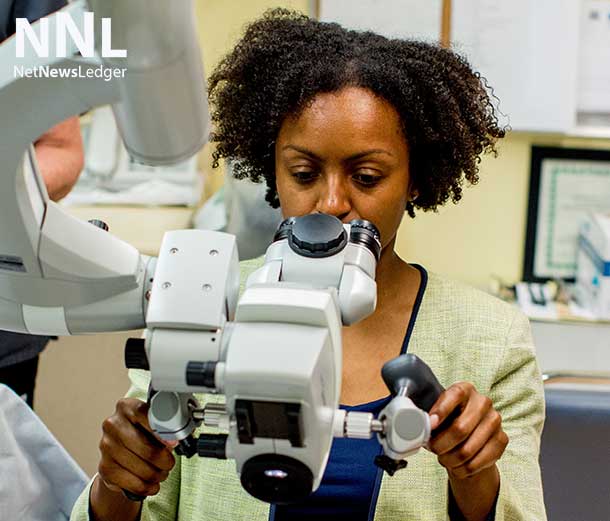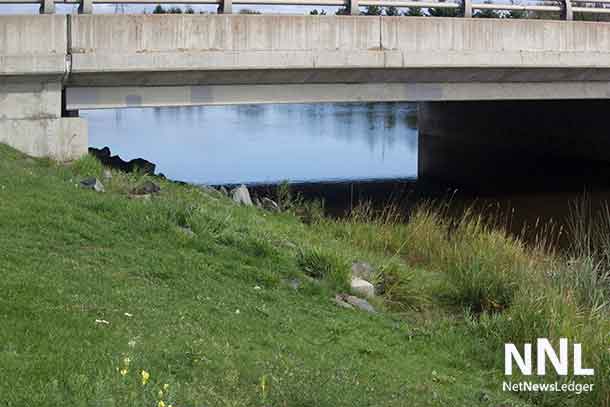

Increased Understandings at Thunder Bay Regional Health Sciences Centre
THUNDER BAY – HEALTH – Sheila White believes that understanding First Nations peoples’ worldview and history are important, particularly in healthcare, where cultural and linguistic misunderstandings have the potential to negatively impact an individual’s health outcomes.
To better address the needs of Aboriginal patients and families, Thunder Bay Regional Health Sciences Centre (TBRHSC) is working to develop cultural sensitivity and awareness among staff and volunteers.
TBRHSC hosts various elders and traditional teachers from the community to offer staff and volunteers opportunities to learn about Aboriginal culture. Most recently, Sheila White, an Anishinaabe Language and Culture Secondary School Teacher, volunteered to provide a series of cultural lessons during the lunch hour. Employees took advantage of the opportunities to learn about a variety of topics, from traditional fall and winter activities, such as storytelling, and basic vocabulary in Ojibwe and Oji-Cree, the two main languages spoken in this region.
Fortunately, White’s own experience with the healthcare system was positive. After her daughter was involved in a serious accident, she was placed in the Intensive Care Unit (ICU) at TBRHSC. It was important to White and her family members to be with her. “They allowed our family to have a ceremony with her in the room,” says White.
“It’s because of the compassionate and exceptional care my daughter received here that I wanted to volunteer to provide these teachings.”
Lisa Laitinen-Egbuchulam, Spiritual Care Specialist at TBRHSC, attended the lunch-hour sessions and also completed all of the available online learning modules for staff regarding Aboriginal culture. She says sensitivity to a person’s background and culture is especially important with Spiritual Care. “Anything I can learn that can add to my understanding of Aboriginal worldviews is helpful to me in my work.”
“My empathy has grown. I’ve learned the importance of just sitting with the Aboriginal patients I see in spiritual care and that I don’t need to fill in the gaps when there is silence.”
Greater understanding and empathy has also been the experience of Sara-Jae Sadler from Switchboard Services. “At Switchboard, we screen calls for patients in ICU and I used to wonder why so many people were calling for one person. Now I understand that for many Aboriginal people, extended family members are considered immediate family.”
Sadler says she is grateful for these learning opportunities, offered on-site and at no cost, that help her in both her personal growth and her work. “Cultural sensitivity is all about patient care. It doesn’t matter what role you play at the hospital, we all contribute to patient care.”
Foundation Support for Aboriginal Health
To close language gaps, the Health Sciences Centre’s patient consent form is being translated to Oji-Cree, Cree, and Ojibwe. Aboriginal patients who do not speak or understand English will now have a form in their language so they clearly understand what treatment or tests they are being asked to consent to, without requiring the services of a translator. The translation is thanks to a Volunteer Association/Thunder Bay Regional Health Sciences Foundation Family CARE Grant, which also funded Aboriginal storybooks, puzzles, and games for Aboriginal and Métis paediatric patients and their families to help create a more welcoming environment for them.

Research Initiative
In January 2014, the Thunder Bay Regional Research Institute officially welcomed their newest Clinician Researcher, Dr. Naana Jumah.
Dr. Jumah joins TBRRI as a Clinician Researcher, with a focus on Aboriginal and women’s health. She also joined Thunder Bay Regional Health Sciences Centre as an Obstetrician-Gynaecologist. As a Clinician Researcher with TBRRI, Dr. Jumah works collaboratively with TBRRI Scientists on various projects in her areas of interest including Aboriginal women’s health, substance use in pregnancy and cervical cancer screening. As the research arm of TBRHSC, TBRRI is contributing to the hospital’s strategic plan, which includes a focus on Aboriginal health.
To read the entire 2013-2014 Annual Report to the Community, please visit: www.tbrhsc.net.











